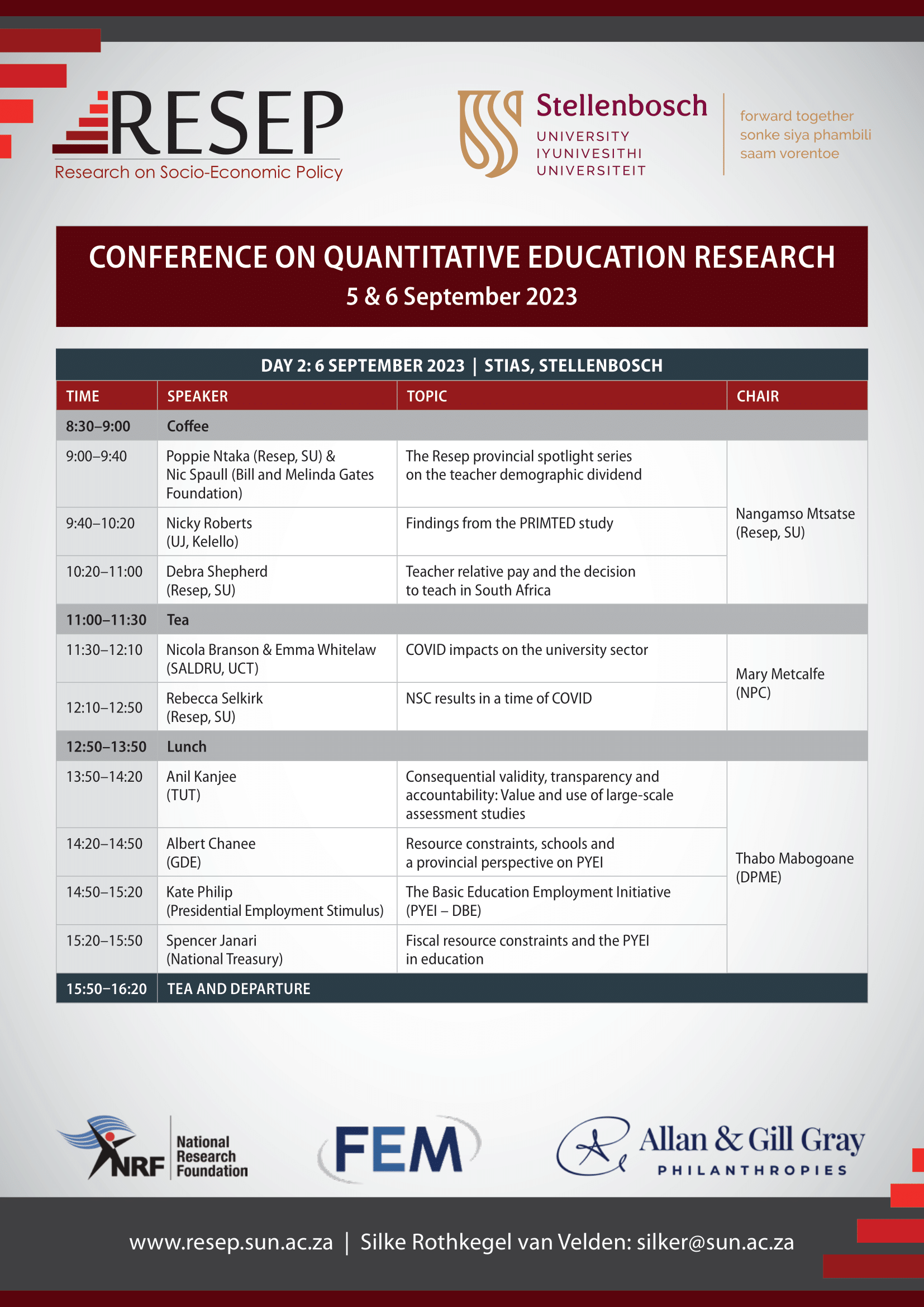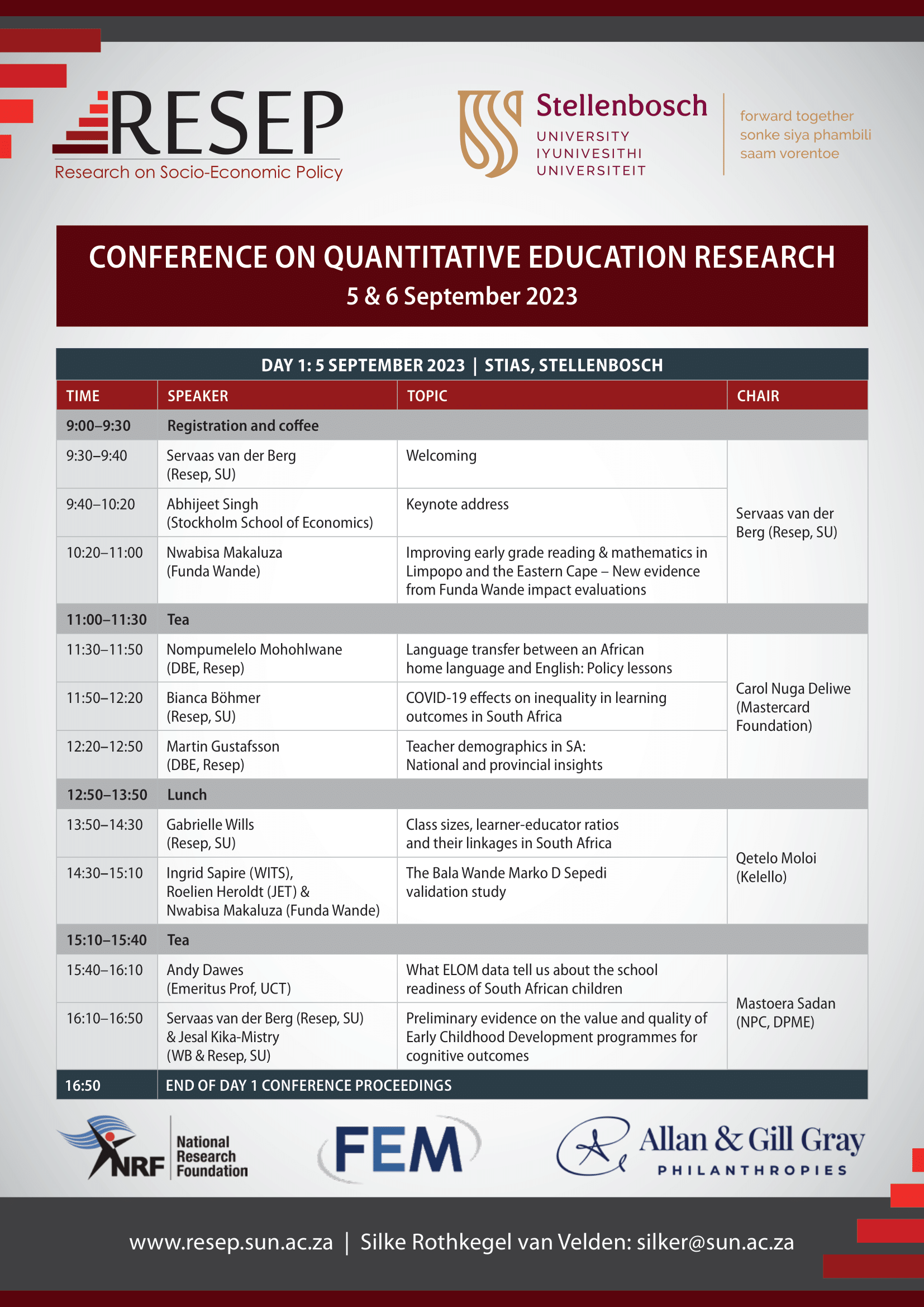RESEP held its 7th annual conference on Quantitative Education Research (QER) from 5-6 September 2023 at STIAS, Stellenbosch University.
Amongst the roughly 100 attendees were NGO representatives, students, academics and representatives from government, including the Presidency, the Department of Basic Education, provincial education departments and the Department of Higher Education and Training. We consider it a privilege to host all these groups in one room, a place where deep thinkers converge with those working hard to dig deeper and stronger foundations for educational improvement. In addition to the informative and high-quality research presented, this two-day engagement demonstrated the maturity and strength that exists in the South African education community of research, policy and practice.

The rest of this blog provides a brief overview of the conference presentations. Writing this overview reminds one that what may appear to be isolated pieces of research, enquiry or practice from early childhood development to higher education are in fact deeply connected, reinforcing of potential pathways towards educational improvement.
A Conference Overview

Abhijeet Singh
The conference kicked off with a keynote address by Abhijeet Singh (download presentation here) from the Stockholm School of Economics. His large-scale research on COVID-19 learning losses and recovery in India focused our attention on two themes interweaving through the conference: the learning crisis and the value of tracking learning outcomes and the coordinating role of government in mobilising large-scale supplementary and remedial programmes for learning improvements. Three additional conference themes also emerged over two days – the centrality of teachers to addressing a learning crisis, improving resource and teacher utilisation in a context of resource constraints and focusing on quality improvements in delivering early childhood education.
1. The Learning Crisis and Tracking Learning
Bianca Böhmer’s (download presentation here) analysis of PIRLS data outlined the extent of literacy and language losses in the 2021 test scores of South African Grade 4s. Widening learning inequality across language groups and socio-economic status due to pandemic disruptions is clearly evident. Against these losses and a more pronounced reading crisis, Nompumelelo Mohohlwane (download presentation here) emphasised the importance of children mastering reading in their home language before a transition to learning in a second language – this approach improves second language reading while the converse (focusing on second language reading acquisition before reading mastery occurs in home language) does not hold true.

Rebecca Selkirk
Despite learning losses at Foundation Phase grade levels, declining repetition rates during Covid years and reduced school drop-out led to unexpected large increases in candidates writing and successfully passing the National Senior Certificate from 2021-2020 as explained by Rebecca Selkirk (download presentation here). At the post-school level, however, there were higher levels of student drop-out from previously disadvantaged universities in 2020 and unexplained improvements in 2020 student results at a higher education institution as discussed by Nicola Branson and Emma Whitelaw (download presentation here).

Nicola Branson
As Singh reflected, “understanding the effects of COVID-19 on education will need long-term follow-ups and current estimates of learning loss are only partially informative.” Clearer estimates of learning levels and tracking improvement at all levels of education will also require that we think more critically about assessments, develop appropriate tests and strengthen psychometrics as discussed by Anil Kanjee (download presentation here). In this vein, Roelien Herholdt’s presentation (download presentation here) on the Bala Wande Marko D Sepedi validation study demonstrated the effort and dedication required to develop numeracy assessments. Appropriate assessments are also needed to track the knowledge levels of prospective teachers entering and exiting the higher education environment as discussed by Nicky Roberts (download presentation here) in her presentation on the PRIMTED study.
Roberts also highlighted the importance of attracting better-prepared students into teaching.

2. Teachers as Central to Addressing a Learning Crisis
Teaching is currently not a profession of first choice in South Africa, as Debra Shepherd (download presentation here) shared in her analysis. In TALIS just under half of all South African teachers stated that teaching was their first-choice career – an outlier relative to other countries participating in TALIS.
Yet attracting and retaining quality teachers matters. Martin Gustafsson’s (download presentation here) work on modelling teacher supply and demand highlights the need to grow the South African teacher workforce through teacher hiring to meet demand in lieu of rising learner enrolments. He defined the clear trade-offs that exist between paying teachers more (with above inflation increases) and ensuring there are enough teachers in the system. Poppie Ntaka and Nic Spaull (download presentation here) further interrogated these issues in a provincial overview of enrolment and teacher demand requirements.
3. Improving Resource Utilisation in a Context of Budgetary Cuts
As teacher hiring (distinct from teacher supply) has lagged learner enrolment increases in some provinces, South Africa has been experiencing rising learner-educator ratios. As discussed by Gabrielle Wills (download presentation here), there is an immediate need for an increased focus on improved utilisation of existing teachers to mitigate the impacts of rising learner-educator ratios on class sizes.
In general, improved resource utilisation is necessary in a budget-constrained environment. Spencer Janari‘s (Treasury) (download presentation here) overview of the South African education budget articulated the economic pressures and spending cuts facing the system. Fiscal constraints make the work of meeting schooling needs and managing large education systems more complex, requiring rigorous attention to planning and prioritisation as seen in the presentation of Albert Chanee (Gauteng Department of Education) (download presentation here).
4. Improving the Quality of Early Childhood Education (ECD)

Servaas van der Berg
Despite general budget cuts in basic education, higher budgets are being allocated to ECD to support scale-up of provisioning. Andy Dawes (download presentation here) and Servaas van der Berg (download presentation here) highlighted how ECD scale-up must be met with commensurate efforts to improve the quality of ECD programming. If not, the hoped for gains of expanding ECD provisioning for improved school readiness are unlikely to be realised. Work by Jesal Kika-Mistry provides evidence of the importance of capacitating ECD practitioners with skills and knowledge to support the development of young children.

5. Government Capacity to Mobilise and Implement Large-scale Supplementary and Remedial Programmes for Learning Improvements
Finally, Kate Phillip’s (download presentation here) address on the Presidential Youth Employment Initiative was a reminder that there exists capability within South Africa to rapidly mobilise very large programmes to assist schools and support youth transitions from education to the workplace. This has been demonstrated in the large-scale deployment of teacher assistants. Nwabisa Makaluza (download presentation here), a day earlier, articulated possibilities for Foundation Phase learning improvements by capacitating teacher assistants to support teachers in the classroom, drawing on the impact findings of Funda Wande’s teacher assistant interventions.

In closing, this convergence of high quality research and presentations at the QER conference would not have been possible without funding support from Allan and Gill Gray Philanthropies, FEMEF and the NRF. We also attribute the success of this conference to the time, effort and collegiality contributed by all participants.
Click here to download the QER programme.







